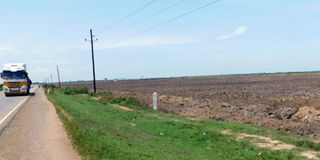Environmentalists, rice firm wrangle over Lwera swamp

A section of Lwera wetland on the Kampala-Masaka highway which Chinese investors have cleared to expand their rice fields. PHOTO BY MUZAFARU NSUBUGA
KALUNGU-Environmentalists have raised the red flag over the ongoing expansion of rice fields in Lwera swamp in Kalungu District.
Chinese investors trading under Zhong Industries Ltd are currently expanding their rice fields near Lukaya Natural Rice Factory, a development environmentalists say has a negative impact on the area eco-system, which would consequently affect the communities around.
Lwera swamp, which stretches about 20kms along the Kampala–Masaka highway, is a major water catchment area that connects several rivers and wetlands in Gomba, Mpigi and Kalungu districts and drains directly into Lake Victoria.
“At first, it was excessive sand mining and now rice growing is taking its toll on the wetland. Something has to be done because the chemicals and fertilisers being used in rice growing are destructive to the environment, particularly the aquatic organisms in the swamp,” Mr David Kureeba, an environmentalist and programme coordinator at National Association of Professional Environmentalists (Nape), said during an interview at the weekend.
Danger to environment
According to Mr Kureeba, sand mining in Lwera has already caused collateral damage to the environment and many investors leave ditches open to serve as fish ponds, contrary to National Environment Management Authority (Nema) guidelines.
“We have made a lot of noise over the destruction of Lwera, but it seems those in authority are not bothered. May be they will wake up when the highway itself is swept away and Lukaya Town gets flooded,” he added.
The concern by environmentalists comes a few weeks after a section of Kampala-Masaka highway developed a huge hole, causing concern that the entire section might collapse. The hole has since been sealed by Uganda National Roads Authority.
However, Mr Isaac Ochen, one of the managers at Lukaya Natural Rice Farm, defended their plan to extend rice fields closer to Kampala–Masaka highway, saying it is more environmentally friendly than destroying the fragile part of the wetland on Lake Victoria shores.
“Our land [1600 acres] stretches to the lake shores, but we decided to abandon that part closer to the lake over environmental concerns and got a new piece of land along the highway. If we were not sensitive about the environment, we couldn’t have done that,” he said.
He said they were forced to expand their rice fields to meet the growing demand for rice on the local market.
A number of local farmers who have been planting seasonal crops in Lwera swamp such as sweet potatoes, cassava, Irish potatoes, green pepper and cabbages have vacated to look for land elsewhere after being compensated.
The Kalungu District environment officer, Mr Richard Vvube, said he warned the Chinese investors claiming another part of the wetland before getting permission.
However, Mr Ochen insists all their activities were cleared by both Ministry of Agriculture and Nema.
Mr Tonny Acidria, a senior Nema public relations officer, clarified that it is the Agriculture ministry that allowed the Chinese investors to carry out commercial rice growing in Lwera, not Nema.
When contacted yesterday, Mr Solomon Kalema, the Ministry of Agriculture spokesperson, asked for more time to consult his superiors before commenting on the matter.
Efforts to speak to Mr Vincent Ssempijja, the minister for Agriculture, were futile by press time.
Mr Ssempijja, who also doubles as the area MP (Kalungu West Constituency), helped in the initiation of the rice project in Lwera and has on several occasions supported the conversion of part of Lwera into an industrial park to create jobs for the youth in the area.




